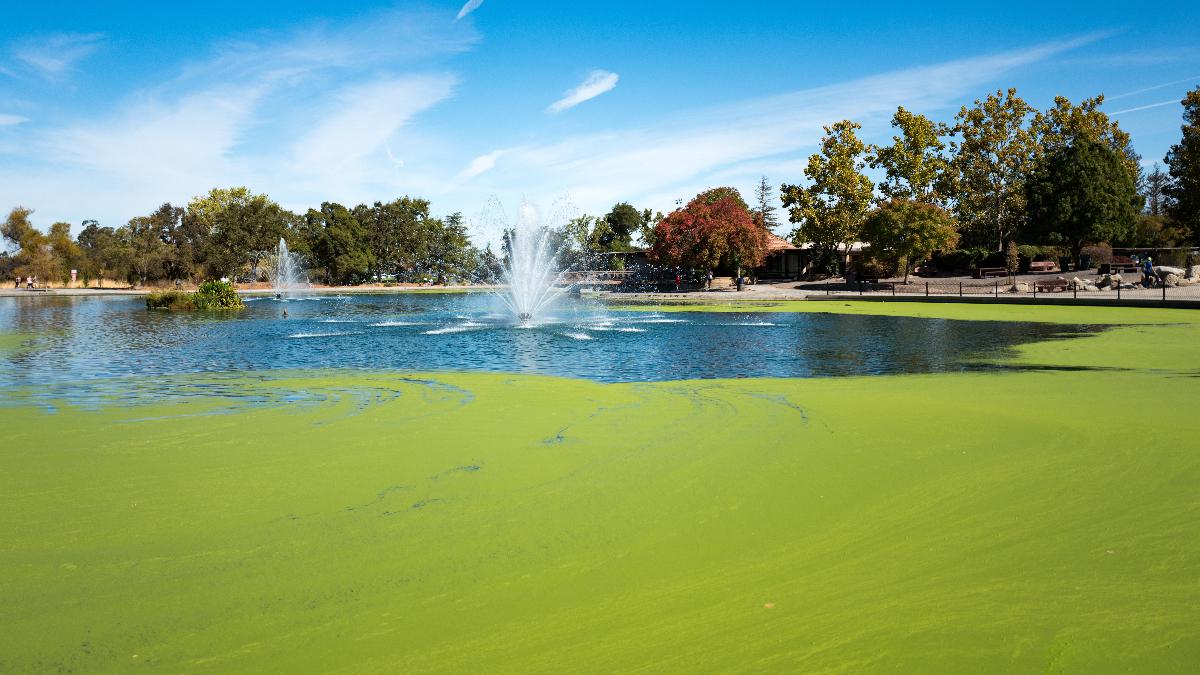
Algal Blooms Could Spew Lethal Toxins Into the Air, New Study Suggests

An algal bloom on a pond in Heather Farm Park, Walnut Creek, California on Oct. 8, 2016. Smith Collection / Gado / Getty Images
Harmful algal blooms may be even more harmful than we thought.
They have already been shown to kill the fish that swim in the water they infest or the animals that drink from it. Now, new research indicates they could even poison the air. In a study published in Lake and Reservoir Management this month, scientists for the first time detected an airborne instance of the algal toxin anatoxin-a (ATX), also known as “very fast death factor.”
“ATX is one of the more dangerous cyanotoxins produced by harmful algal blooms, which are becoming more predominant in lakes and ponds worldwide due to global warming and climate change,” study lead author Dr. James Sutherland of the Nantucket Land Council said in a press release.
ATX is a toxin made by cyanobacteria, or blue-green algae. Despite their name, these single-celled organisms are not plants but rather bacteria that can photosynthesize. The toxin can cause loss of coordination, muscular twitching and respiratory paralysis. It has been known to kill livestock, pets and other animals that drink contaminated water.
“Although no previous studies have documented the capture of airborne ATX molecules or cyanobacteria cells containing ATX, we hypothesized that ATX could become airborne under certain environmental conditions,” the study authors wrote.
To test this idea, the scientists devised a way to sample the air above a pond in Nantucket, Massachusetts dealing with a harmful algal bloom (HAB). They brought an air sampling device to the shore on windy days and collected airborne particles on filters. They also tested the water for the presence of the toxin.
The scientists collected their samples between July and October of 2019. They detected ATX in the water at concentrations as high as 21 nanograms per milliliter, Science Alert reported. And, on one foggy and windy day in September, they detected it in the air also. They recorded an average of 0.87 nanograms per filter on their air sampling device, which would equal an airborne exposure of 0.16 nanograms per meter squared.
The researchers are not sure how the toxin ended up in the air, but think the wind might have blown it in small droplets from the pond, and then the fog allowed it to persist for longer than usual. In any case, it is a problem worth investigating further.
“These findings indicate that emission of ATX molecules, or cyanobacteria containing ATX, during HABs presents a potential human health exposure not previously examined,” the researchers wrote.
Harmful algal blooms are a problem for many other reasons, of course. They can deprive water of oxygen as they decompose, killing fish and degrading water quality, the press release explained. They are also made worse by human activity, according to Science Alert. They are fed partly by excess nutrient pollution from agricultural runoff. As Sutherland noted, they are also exacerbated by the climate crisis. The cyanobacteria prefer warmer water temperatures, and heavy rain from extreme weather events can wash more fertilizer and other nutrients into bodies of water.
The research just signals another reason to be wary of pond scum.
“People often recreate around these lakes and ponds with algal blooms without any awareness of the potential problems,” Sutherland said in the press release. “Direct contact or inhalation of these cyanotoxins can present health risks for individuals, and we have reported a potential human health exposure not previously examined.”
- Harmful Algal Blooms Are Increasing Across the U.S. - EcoWatch
- Toxic Algae Blooms Set New Records From Coast to Coast ...
- Earth’s Largest Extinction Event Saw Toxic Algal Blooms at Concentrations Observed Today - EcoWatch

 233k
233k  41k
41k  Subscribe
Subscribe 